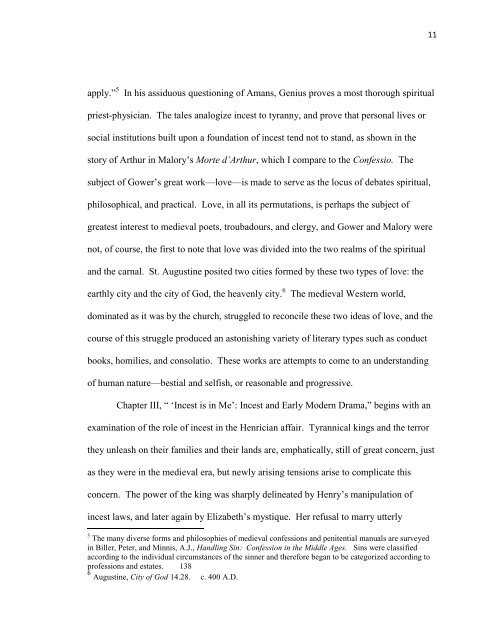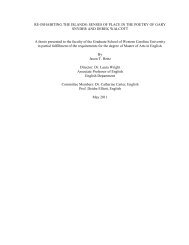SUMMERS, KAREN CRADY, Ph.D. Reading Incest - The University ...
SUMMERS, KAREN CRADY, Ph.D. Reading Incest - The University ...
SUMMERS, KAREN CRADY, Ph.D. Reading Incest - The University ...
You also want an ePaper? Increase the reach of your titles
YUMPU automatically turns print PDFs into web optimized ePapers that Google loves.
11<br />
apply.” 5<br />
In his assiduous questioning of Amans, Genius proves a most thorough spiritual<br />
priest-physician. <strong>The</strong> tales analogize incest to tyranny, and prove that personal lives or<br />
social institutions built upon a foundation of incest tend not to stand, as shown in the<br />
story of Arthur in Malory’s Morte d’Arthur, which I compare to the Confessio. <strong>The</strong><br />
subject of Gower’s great work—love—is made to serve as the locus of debates spiritual,<br />
philosophical, and practical. Love, in all its permutations, is perhaps the subject of<br />
greatest interest to medieval poets, troubadours, and clergy, and Gower and Malory were<br />
not, of course, the first to note that love was divided into the two realms of the spiritual<br />
and the carnal. St. Augustine posited two cities formed by these two types of love: the<br />
earthly city and the city of God, the heavenly city. 6<br />
<strong>The</strong> medieval Western world,<br />
dominated as it was by the church, struggled to reconcile these two ideas of love, and the<br />
course of this struggle produced an astonishing variety of literary types such as conduct<br />
books, homilies, and consolatio. <strong>The</strong>se works are attempts to come to an understanding<br />
of human nature—bestial and selfish, or reasonable and progressive.<br />
Chapter III, “ ‘<strong>Incest</strong> is in Me’: <strong>Incest</strong> and Early Modern Drama,” begins with an<br />
examination of the role of incest in the Henrician affair. Tyrannical kings and the terror<br />
they unleash on their families and their lands are, emphatically, still of great concern, just<br />
as they were in the medieval era, but newly arising tensions arise to complicate this<br />
concern. <strong>The</strong> power of the king was sharply delineated by Henry’s manipulation of<br />
incest laws, and later again by Elizabeth’s mystique. Her refusal to marry utterly<br />
5 <strong>The</strong> many diverse forms and philosophies of medieval confessions and penitential manuals are surveyed<br />
in Biller, Peter, and Minnis, A.J., Handling Sin: Confession in the Middle Ages. Sins were classified<br />
according to the individual circumstances of the sinner and therefore began to be categorized according to<br />
professions and estates. 138<br />
6 Augustine, City of God 14.28. c. 400 A.D.
















